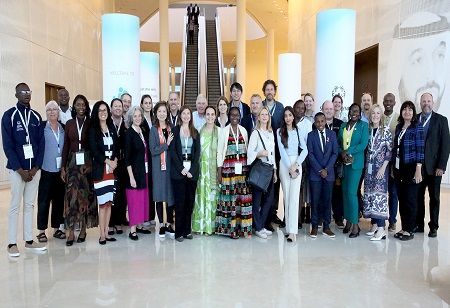Special Olympics Global Center for Inclusion in Education now launches its far-reaching research roadmap, ‘A Global Research Agenda for Building Inclusive Learning Environments’. Led by the Global Center's Research Collaborative consisting of researchers from leading international universities, such as Yale University, Harvard University and NYU Abu Dhabi this effort is a forward-looking strategy for closing essential knowledge gaps in disability-inclusive education and sport to enhance educational outcomes for students with and without Intellectual and Developmental Disabilities (IDD).
This effort arises in response to a dire lack of data-informed research studies on inclusion and its dividends. These knowledge deficits adversely affect students' learning outcomes, creating cycles of exclusion and constraining their potential. In the absence of strong evidence to guide policies and practices, education systems are unable to offer the support required for students with IDD, leading to lower academic performance, social isolation and reduced opportunities for lifelong success. The World Bank has estimated that excluding individuals with disabilities from education, sport, work and the rest of society can lower the GDP of a nation by 3-7 percent.
The Research Agenda therefore presents a set of core questions on inclusion from the cost savings inherent in inclusive programming, to optimal partnerships and best practices required to underpin successful implementation of inclusive education that urgently need to be answered and underpinned by robust evidence, after decades of neglect by the international research community.
The Launch of the Research Agenda was held in Berlin, Germany alongside the 2025 Global Disability Summit a gathering of global, regional, and national stakeholders who are united in their shared vision and ambition for disability-inclusive development and humanitarian action. With leading international scholars in attendance, policymakers and disability rights activists, Special Olympics leaders outlined the organization's six main areas of research on which it will be concentrating its efforts to build inclusion in education and sport:
- Defining Inclusion Across Contexts and Cultures
- Building the Capacity of Educators, Coaches, and Other Adults to Deliver Inclusive Learning
- Strengthening School, Family, and Community Connections
- Driving Impact Through Evaluation and Measurement
- Empowering Underserved and Displaced Groups (refugee and migrant communities included)
- Ensuring Artificial Intelligence is used to Promote Inclusion
In spite of tremendous worldwide advances in putting more emphasis on inclusion in education and sporting events, hurdles still need to be overcome to put policies into practice and programming. UNESCO's 209 country analysis finds that there is a gap between inclusive education policy and legislation, with policies moving toward inclusive education faster than laws. Whereas 38 percent of countries promote inclusion through policy, a mere 17 percent of countries legislate the right to inclusive education. Alarmed, 25 percent of countries have enabling language in their laws for completely segregated education.
The truth is that most IDD children continue to be isolated in special education classes, or worse, are excluded from education altogether. The Research Agenda sets out the blueprint for making much-needed gains in this area by defining knowledge gaps, prioritizing cross-cultural and contextual research, and making sure interventions are tailored to varying environments and communities.
‘Real progress in inclusive education will not occur in isolation’, It takes robust collaboration between governments, researchers, and organizations to bring policies into action. This Research Agenda gives a clear direction to assist in pushing that collaboration forward", added Tala Al Ramahi, Director in the Office of Development Affairs, United Arab Emirates (UAE), and former Chief Strategy Officer of the Special Olympics World Games Abu Dhabi. The UAE is committed to building inclusive societies where all people can contribute to and benefit from global progress.
Launched in 2022, the Research Collaborative constitutes 32 global scholars, Special Olympics athletes, and youth leaders from around the world to continue inclusive research. Their combined experience will inform future research, shape policy, and drive meaningful change in inclusive education and sport. This achievement is facilitated by His Highness Sheikh Mohamed bin Zayed Al Nahyan, President of the United Arab Emirates, after receiving a $25 million donation to the Special Olympics in 2020.

